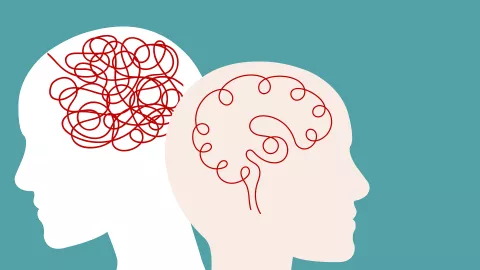Understanding mental illnesses
Causes of Mental Illnesses
A multitude of factors can contribute to the development of mental illnesses. Biological factors, such as genetics and brain chemistry, play a significant role in predisposing individuals to conditions like depression, anxiety disorders, and schizophrenia. Additionally, traumatic life experiences, including childhood abuse, neglect, or exposure to violence, can increase the risk of developing mental health issues later in life.
Environmental factors also play a crucial role in the onset of mental illnesses. Stressful life events, such as financial difficulties, relationship problems, or work-related stress, can trigger or exacerbate conditions like post-traumatic stress disorder (PTSD) or panic disorder. Substance abuse, including the misuse of drugs and alcohol, can also significantly impact a person’s mental health and increase susceptibility to developing mental disorders.
Types of Mental Disorders
Mental disorders encompass a broad spectrum of conditions that can significantly impact an individual’s thoughts, feelings, and behaviors. One prevalent type is anxiety disorders, characterized by persistent worry, irrational fears, and physical symptoms such as palpitations and sweating. Generalized Anxiety Disorder, Panic Disorder, and Phobias are common forms within this category, each presenting unique challenges to those affected.
Another category of mental disorders is mood disorders, affecting a person’s emotional state and overall disposition. Major Depressive Disorder, characterized by persistent feelings of sadness, hopelessness, and loss of interest in previously enjoyable activities, is a prevalent mood disorder. Bipolar Disorder is another significant condition within this category, involving extreme mood swings between manic episodes of heightened energy and depressive episodes of low mood and energy. The complexities and variations within mood disorders highlight the diverse ways in which mental health can manifest in individuals.
Symptoms of Common Mental Illnesses
Depression, a prevalent mental illness, often manifests through persistent feelings of sadness, hopelessness, and loss of interest in activities once enjoyed. Individuals experiencing depression may struggle with disturbances in sleep patterns, changes in appetite, and difficulty concentrating. Additionally, they may exhibit physical symptoms such as fatigue or aches that are not attributed to any known medical condition.
Anxiety disorders, another common mental health concern, can be characterized by excessive worry, restlessness, and irritability. People with anxiety disorders may experience panic attacks, which are sudden episodes of intense fear or discomfort. They may also exhibit avoidance behaviors in an attempt to cope with their overwhelming feelings of anxiety. Physical symptoms like palpitations, sweating, and trembling are frequently associated with anxiety disorders.
Effects of Untreated Mental Illness
Untreated mental illness can have severe consequences on an individual’s overall well-being. Without proper intervention, psychological conditions may worsen over time, leading to a decline in one’s quality of life. The impact of unaddressed mental health issues can extend beyond personal struggles and affect various aspects of daily functioning.
Furthermore, untreated mental illness can hinder an individual’s ability to maintain stable relationships with others. The symptoms of psychological disorders may lead to communication barriers, emotional distance, and difficulty in forming and maintaining social connections. This can result in feelings of isolation and alienation, further exacerbating the detrimental effects of untreated mental health conditions.
Diagnosing Mental Health Conditions
When it comes to diagnosing mental health conditions, healthcare professionals rely on a variety of assessment tools and techniques to accurately identify and classify disorders. Clinical interviews, self-report questionnaires, observation of behavior, and neuropsychological tests are commonly utilized during the diagnostic process. These methods allow clinicians to gather comprehensive information about an individual’s symptoms, history, and functioning, enabling them to make a precise diagnosis based on established criteria outlined in the Diagnostic and Statistical Manual of Mental Disorders (DSM-5).
Additionally, medical professionals may collaborate with other team members, such as psychiatrists, psychologists, social workers, and primary care physicians, to ensure a multidimensional approach to diagnosis. This interdisciplinary approach is crucial in considering various factors that may contribute to mental health conditions, including biological, psychological, social, and environmental influences. By conducting thorough assessments and consultations, healthcare providers can formulate a comprehensive understanding of the individual’s mental health status and develop a tailored treatment plan to address their specific needs.
Treatment Options for Mental Illnesses
Treatment options for mental illnesses vary depending on the individual’s specific condition and needs. Common approaches include psychotherapy, such as cognitive-behavioral therapy (CBT) or dialectical behavior therapy (DBT), which aim to help individuals understand and manage their thoughts, emotions, and behaviors. These therapies provide a safe space for individuals to explore their feelings and develop coping strategies to improve their mental well-being. Additionally, medication can be prescribed by a psychiatrist to help stabilize mood, reduce anxiety, or manage other symptoms associated with mental health disorders.
In some cases, a combination of therapy and medication may be recommended to achieve optimal treatment outcomes. Other treatment options for mental illnesses may include lifestyle modifications, such as regular exercise, a healthy diet, and stress-reduction techniques. It is crucial for individuals to work closely with mental health professionals to determine the most effective treatment plan tailored to their unique needs and circumstances.
Medication for Mental Health Disorders
Medication plays a crucial role in the treatment of various mental health disorders. It is often prescribed to help manage symptoms and improve the overall well-being of individuals struggling with conditions like depression, anxiety, bipolar disorder, and schizophrenia. Different types of medications are available, including antidepressants, mood stabilizers, antipsychotics, and anxiolytics, each targeting specific symptoms and biochemical pathways in the brain. It is essential for individuals to work closely with their healthcare providers to find the most suitable medication and dosage to effectively address their unique needs.
While medication can be highly beneficial in managing symptoms of mental health disorders, it is important to recognize that it may not be a standalone solution. In many cases, medication is most effective when combined with therapy, lifestyle modifications, and support systems. Additionally, individuals prescribed medication for mental health disorders should be mindful of potential side effects and the importance of adhering to their treatment plan as prescribed by their healthcare provider. Regular monitoring and open communication with healthcare professionals are key components in ensuring the safe and effective use of medication for mental health disorders.
Therapy Modalities for Mental Illnesses
Therapy modalities for mental illnesses encompass a range of approaches tailored to address the diverse needs of individuals grappling with psychological distress. Cognitive-behavioral therapy (CBT) stands as a prominent method that focuses on modifying negative thought patterns and behaviors to foster healthier coping mechanisms. By challenging maladaptive beliefs and promoting constructive actions, CBT equips patients with practical skills to navigate challenging situations and manage symptoms effectively.
Alternatively, dialectical behavior therapy (DBT) integrates elements of mindfulness, distress tolerance, emotional regulation, and interpersonal effectiveness to help individuals cultivate emotional resilience and enhance their relationships. Through a combination of individual therapy sessions and group skills training, DBT aims to foster self-awareness, reduce impulsive behaviors, and promote adaptive responses to triggers. This holistic approach empowers individuals to navigate emotional turmoil with grace and build a sense of emotional balance.
Support Systems for Individuals with Mental Illness
Having a strong support system is crucial for individuals battling mental illness. Friends, family members, therapists, and support groups can provide an invaluable network of encouragement and understanding. Their unwavering support can help individuals navigate the challenges of mental illness and achieve a sense of stability and well-being.
Support systems can offer emotional support, practical assistance, and a sense of belonging that is essential for individuals with mental health concerns. Whether it’s a listening ear, helping with daily tasks, or participating in therapy sessions, a reliable support system can make a significant difference in someone’s journey towards recovery and improved mental health.
Stigma Surrounding Mental Health
Stigma surrounding mental health remains a significant barrier to individuals seeking help and support for their conditions. This stigma is often rooted in misconceptions, fear, and a lack of understanding about mental illnesses. It can lead to discrimination, isolation, and shame, prompting people to hide their struggles and avoid seeking necessary treatment.
Negative stereotypes and judgments about mental health can perpetuate the stigma, causing individuals to feel marginalized and reluctant to disclose their conditions. This can have a detrimental impact on their overall well-being, hindering their ability to access the care and support they need. Addressing and combating this stigma is crucial in promoting a more inclusive and understanding society where individuals feel empowered to seek help without fear of judgment or discrimination.
Prevention Strategies for Mental Illnesses
Prevention of mental illnesses begins with promoting mental well-being and resilience in individuals. This can be achieved through targeted interventions that address risk factors such as trauma, abuse, and chronic stress. Encouraging healthy lifestyle habits, early detection of mental health concerns, and access to support systems can also play a crucial role in preventing the onset of mental illnesses.
Furthermore, creating supportive environments that reduce stigma surrounding mental health can contribute to the prevention of mental illnesses. Education programs, community awareness initiatives, and destigmatization efforts can help individuals feel more comfortable seeking help and support when needed. By fostering a culture of understanding and acceptance, we can work towards preventing the development of mental health disorders.
Impact of Mental Illness on Relationships
Mental illness can significantly strain relationships, causing disruptions in communication and mutual understanding. Individuals grappling with mental health issues may struggle to express their thoughts and emotions effectively, leading to misunderstandings and conflicts within relationships. Moreover, the symptoms of mental disorders such as mood swings, irritability, and social withdrawal can create distance between partners, family members, or friends.
The impact of mental illness on relationships can also be felt through the imbalance of caregiving responsibilities and emotional support. Often, the burden of caregiving falls on the shoulders of one individual, leading to feelings of isolation and exhaustion. This imbalance can create resentment and feelings of inadequacy in both the individual affected by mental illness and their loved ones, further straining the relationship dynamics.
Resources for Individuals with Mental Health Concerns
Individuals struggling with mental health concerns can access a variety of resources to support their well-being. These resources may include helplines staffed by trained professionals who can provide emotional support and guidance in times of crisis. Additionally, online platforms and mobile applications offer information on mental health conditions, coping strategies, and self-care techniques.
Community mental health centers provide counseling services, support groups, and referrals to specialized treatment providers. Furthermore, non-profit organizations and advocacy groups offer educational resources, workshops, and events to raise awareness about mental health issues and reduce stigma. By taking advantage of these resources, individuals can build a network of support and empower themselves to manage their mental health effectively.







